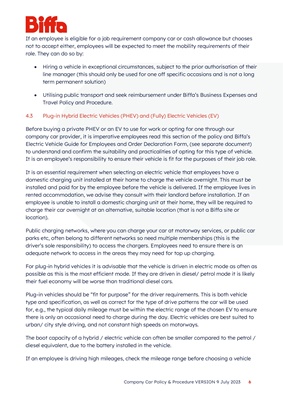
Company Car Policy & Procedure VERSION 9 July 2023 6
If an employee is eligible for a job requirement company car or cash allowance but chooses
not to accept either, employees will be expected to meet the mobility requirements of their
role. They can do so by:
• Hiring a vehicle in exceptional circumstances, subject to the prior authorisation of their
line manager (this should only be used for one off specific occasions and is not a long
term permanent solution)
• Utilising public transport and seek reimbursement under Biffa's Business Expenses and
Travel Policy and Procedure.
4.3 Plug-in Hybrid Electric Vehicles (PHEV) and (Fully) Electric Vehicles (EV)
Before buying a private PHEV or an EV to use for work or opting for one through our
company car provider, it is imperative employees read this section of the policy and Biffa's
Electric Vehicle Guide for Employees and Order Declaration Form, (see separate document)
to understand and confirm the suitability and practicalities of opting for this type of vehicle.
It is an employee's responsibility to ensure their vehicle is fit for the purposes of their job role.
It is an essential requirement when selecting an electric vehicle that employees have a
domestic charging unit installed at their home to charge the vehicle overnight. This must be
installed and paid for by the employee before the vehicle is delivered. If the employee lives in
rented accommodation, we advise they consult with their landlord before installation. If an
employee is unable to install a domestic charging unit at their home, they will be required to
charge their car overnight at an alternative, suitable location (that is not a Biffa site or
location).
Public charging networks, where you can charge your car at motorway services, or public car
parks etc, often belong to different networks so need multiple memberships (this is the
driver's sole responsibility) to access the chargers. Employees need to ensure there is an
adequate network to access in the areas they may need for top up charging.
For plug-in hybrid vehicles it is advisable that the vehicle is driven in electric mode as often as
possible as this is the most efficient mode. If they are driven in diesel/ petrol mode it is likely
their fuel economy will be worse than traditional diesel cars.
Plug-in vehicles should be "fit for purpose" for the driver requirements. This is both vehicle
type and specification, as well as correct for the type of drive patterns the car will be used
for, e.g., the typical daily mileage must be within the electric range of the chosen EV to ensure
there is only an occasional need to charge during the day. Electric vehicles are best suited to
urban/ city style driving, and not constant high speeds on motorways.
The boot capacity of a hybrid / electric vehicle can often be smaller compared to the petrol /
diesel equivalent, due to the battery installed in the vehicle.
If an employee is driving high mileages, check the mileage range before choosing a vehicle